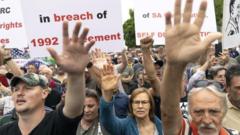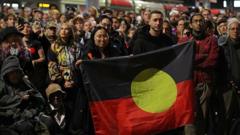A South African court has dismissed claims of “white genocide” as “imagined,” blocking a donation to a white supremacist group, underlining the country’s complex racial dynamics and contrasting U.S. political commentary surrounding the issue.
South African Court Rejects 'White Genocide' Claims Amid Controversies

South African Court Rejects 'White Genocide' Claims Amid Controversies
The court's decision challenges narratives around white minority safety and anti-racist rhetoric linked to high-profile figures.
In a notable judicial decision, a South African court has outrightly dismissed claims of a "white genocide" in the country, branding such assertions as "clearly imagined" and "not real." This ruling arrives as a direct counter to comments made by prominent personalities such as former U.S. President Donald Trump and tech mogul Elon Musk, significantly complicating the discourse surrounding race relations in South Africa.
The court intervened after a wealthy benefactor named Grantland Michael Bray attempted to bequeath $2.1 million to the Boerelegioen, a white supremacist group promoting messages of racial intolerance and division. The court deemed the bequest invalid, asserting that it lacked clarity and contradicted public policy.
Trump had previously amplified concerns over the safety of white farmers in South Africa, citing a “large-scale killing of farmers,” while Musk has denounced perceived injustices like "racist ownership laws." The claims have drawn scrutiny, particularly against the backdrop of the recent court ruling, which has surfaced amid ongoing debates about land reform and minority rights in South Africa.
The litigation was initiated by Bray's siblings, who contended that their brother had become fixated on unfounded notions of a looming genocide against white people in South Africa during the last decade of his life, particularly after he suffered paralysis from a military accident. Evidence was presented suggesting that Bray’s paranoia had been intensified by the racially charged content he encountered online.
Bray's association with the Boerelegioen, which he believed was crucial in resisting a purported impending slaughter of whites, included extensive financial support amounting to approximately $326,000 in gold coins. A significant portion of his estate was intended to fund training initiatives by the group. However, the court found Bray’s will ambiguous regarding which specific entity of the Boerelegioen the funds should benefit, ultimately favoring his siblings' position.
The ruling by Judge Rosheni Allie also touched on broader social concerns, stating that Bray's intentions were tainted by extreme racism and the influence of online rhetoric. In light of this, Judge Allie ruled against the bequest, asserting the group’s plans aligned with messages of racial hate, which fundamentally contradicts public policy.
Earlier in the month, Trump took further action by freezing financial aid to South Africa, correlating with new land seizure laws enacted by the South African government. These laws have become a focal point for right-wing politics in the U.S., rallying fears around issues of property rights and racial tensions.
Despite ongoing debates over the targeting of the white Afrikaner minority, official crime statistics reveal a more complex narrative—just twelve of the 6,953 reported murders between October and December 2024 were associated with farm attacks, underscoring the disproportionate focus on the claims of threatened violence against white farmers versus the broader violence affecting various communities in South Africa.
As the legal and social ramifications of this ruling unfold, the case highlights the intricate and often contentious intersections of race, politics, and societal narratives both within South Africa and internationally.




















